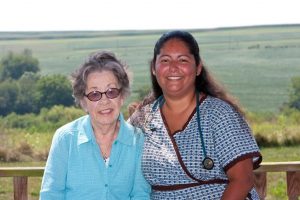Homeland Hospice: Ensuring quality of life
 For those unfamiliar with hospice, the very mention may give rise to uneasy thoughts about death. But in reality, hospice care is all about creating a quality of life for patients.
For those unfamiliar with hospice, the very mention may give rise to uneasy thoughts about death. But in reality, hospice care is all about creating a quality of life for patients.
“When people have a life limiting illness, if the physician feels they have six months or less to live and they are not seeking aggressive therapy they can seek hospice care,” says Sue Minarik, director of Homeland Hospice. But many patients don’t enter hospice until much later. “All too often our patient families tell us they wish they would have known about us sooner.”
From ensuring patients are pain-free to helping them enjoy time with family and friends, Homeland Hospice is about quality of life. Care is provided by a committed team that includes nurses; social workers; spiritual and bereavement counselors; and home health aides and volunteers.
Providing care
Each patient is assigned a primary nurse and a primary social worker, Minarik says. Nurses work with physical pain and symptom management and also keep a careful watch on the emotional well-being of the patient and their family. The social worker is there for emotional support for both the patient and caregiver(s), helping the caregiver(s) in particular, deal with the prognosis of their loved one.
“The nurse kind of steers the ship, if you will,” Minarik says. “She can make visits on a daily or weekly basis.”
As needed, other members of the Homeland Hospice team are brought in to assist with the range of emotions that patients and families go through. Among the support services offered are grief support groups, memorial services and 13 months of follow-up after the patient’s passing to help families cope with their loss.
The social worker sees the patient once or twice a month and sometimes more often, depending on the needs of the family. Social workers in hospice guide families through health care decisions, end-of-life wishes, insurance matters and accessing local resources.
Homeland Hospice also offers daily home health aide services, an important feature that most hospices do not provide.
“Home health aides are wonderful,” Minarik says. “They can visit as many as seven days a week and spend one and a half to two hours with a patient. They assist with personal care, housekeeping, cooking meals, feeding and help with activities, such as accompanying the patient on walks.”
Going well beyond the minimum
Since 1867, Homeland Center has provided the highest standard of care to residents of Central Pennsylvania, and Homeland Hospice embraces that tradition, providing special services for patients that go well beyond what is typically seen.
“Barry Ramper, Homeland Center’s president and CEO, really believes in quality of care,” Minarik says. “He has told us, “If you need anything for patient care, we’ll get it.””
Patients can be treated to haircuts, manicures, perms, hair coloring and other beauty services. Homeland Hospice also has volunteers who provide music and pet therapy and appropriate holistic medicine.
“Obviously the main goal is pain and symptom management,” Minarik says. “But we offer these other services to improve quality of life.”


